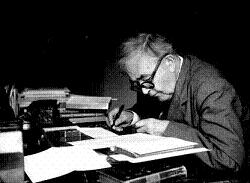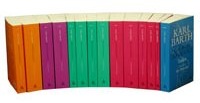§ 7.2
Dogmatics as Science and § 7.3
The Problem of Dogmatic Prolegomena are the conclusion of Karl Barth’s section § 7
The Word of God, Dogma and Dogmatics. In this long introduction to the series (prolegomena which means long long long introduction) Barth sets out his thoughts on the Word of God and Church proclamation. His concern is how closely does Church proclamation matches the Word of God. He took issue with the Roman Catholic and the Orthodox traditions who presume that both are identical.
Is Karl Barth a mystic? No one who has read his readings will in any way link him with the great mystics of the Church. Yet there is a sense of mysticism in the reverent and distance he places on mystery of the Word of God and how it is inadequately proclaimed and interpreted by the Church. At one stroke he shook the epidemiological and ontological foundations of systematic theology like the recent 8.9 earthquake in Japan.
Barth divides dogmatics into regular and irregular. Regular are the curriculum-based approach in theological schools and colleges. Irregular dogmatics is what happens out of these formal institutions of learning and happens at the grassroot levels. Barth seems to be more sympathetic to irregular dogmatics being done by the people of God in the context of their communities in their space and time.
For example, I wonder what Barth will do concerning the situation in Malaysia. In Malaysia, Islam is the dominant religion while the constitution guarantees the freedom for people to practice other religious traditions. Muslims makes up approximately 70% of the population while Christians about 10%. Most Christians are living in East Malaysia and are mainly of indigenous tribal people. The government is lead by a Muslim dominated political party and its officials are mainly Muslims. There is a steady erosion of the freedom for other religious systems in the years following the nation’s independence.
The Christian community is represented by the Christian Federation of Malaysia (which includes Protestants and Catholics). The Christians is also represented in another multi-religious committee in dealing with the government. The interactions can be described as firefighting. The Malaysian government will propose an action that impinges on the religious rights of others. The representatives respond often by press statements and then some backdoor negotiations. The government offers a compromise which is accepted by the representatives. Often the compromise involves the religious bodies giving up more than they receive.
One notable case is the use of the word “Allah”. For the last 31 years, the Christian community has been fighting for the right to use the word “Allah”. My
review of Miroslav Volf ‘s
Allah: The Christian Response. The Muslims claimed that Allah refers to their God and no one else can use this term except them. In fact, Allah has been used by Arab Christian before the Islam was founded. This has resulted in the government seizing and impounding Bibles and Christian books with this word. The Malay Bible (Alkitab) uses Allah and all shipments were impounded and detained by the Home Ministry. The matter come a head when the government refused a license for the Catholic Church to print its Malay language weekly gazette Herald which uses the word Allah (see timeline
here). The Catholic Church took the case to court. The Catholic Church won, allowing the Herald to use the word Allah.
The government appeals against the court’s ruling and the appeal is still pending. After waiting patiently for another year, the Christian community applied pressure on the government to release the Alkitab. The government responded by releasing it after unilaterally placing a stamp on the inner cover of the Alkitab notifying that is for Christian use only by “order of the Home Ministry”. There are various reactions from the Christian community from “Praise the Lord” to cries of desecration of the Bible (see
here and
here).
What will Karl Barth do?
I will suggest the following that Karl Barth will advocate for the following:
(1) The Christian community should stand for God
Karl Barth will be careful to point out that a printed text such as what is call the Bible is distinct from the Word of God though it is a means by which the Word of God is revealed. However, he will be the first to point out that any attempt to restrict or insult the Word of God is not acceptable. Note his response to the Bible burning in Nazi Germany.
(2) The Christian community should address injustice
Social justice figured prominently in the Word of God. Though church proclamation has understood social injustice in different ways and hence their different responses, their commonality is to address social injustices. Justice includes the right to choose. The Word of God reveals a God who offers humankind the right to choose even though they may choose to reject him. Though Barth was dealing with the State Lutheran Church in Germany, his principles of social justice is applicable in Malaysia. Citizens of Malaysia have freedom of worship as guaranteed by their constitution and this freedom includes the freedom to have copies of their sacred texts without any addition by the authorities.
(3) The Christian community shall be proactive and visible.
The Christian community is often perceived by the other communities as being negative by usually taking a stand
against but rarely taking a stand
for. The Christian community must be seen to be united and be proactive in nation building. In response to the Alkitab banning and detention, the Christian community should make
visible their protest. While emails and a few blog posts are helpful, a mass Christian prayer rally will make a greater impact and create greater public awareness of the Christians’ plight. The Word of God directs Christians to pray for those who are against them. The Church proclamation should involve not just itself but also the other communities it is part of. Barth's involvement with the Confessing Church in Nazi Germany is an example of this.
This is how I would envisage Karl Barth’s response to the situation in Malaysia by trying to see his response through the prolegomena of the Church Dogmatics.
.
Labels: Alkitab, Barth, Karl Barth Reading, Malaysia


 Karl Barth’s
Karl Barth’s 
















